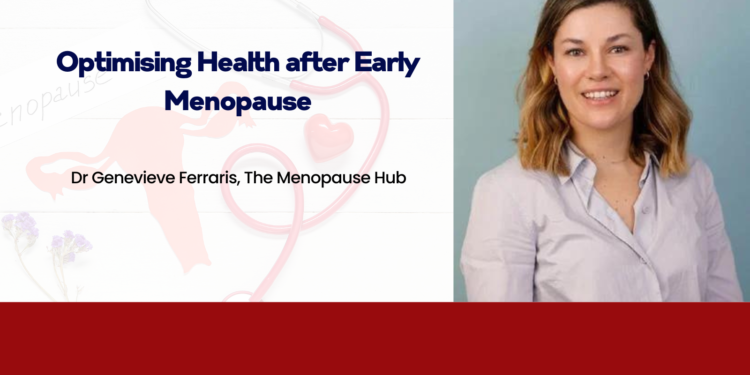The average age of menopause in women in the UK is 51. The onset of perimenopause is around 45. Some women may however go into menopause earlier than this. Menopause between 40-45 is referred to as early menopause. Premature ovarian insufficiency (POI) is when menopause occurs below the age of 40.

Dr Genevieve Ferraris, The Menopause Hub
Early menopause and POI are defined as the loss of normal ovarian activity. Ovulation is diminished and the ovaries produce insufficient levels of estrogen. This clinical syndrome is characterized by erratic or absent periods, raised gonadotrophins (FSH and LH) and low estradiol levels. The prevalence of POI is approximately 1%.
An early menopause may be spontaneous or induced/iatrogenic. The etiology of spontaneous POI is wide ranging, including chromosomal and genetic defects (like Fragile X syndrome and Turner syndrome), autoimmune disorders, infections, exposure to environmental toxins and idiopathic. Iatrogenic causes include radiotherapy, chemotherapy and surgery (oophorectomy).
What are the symptoms of early menopause?
The most common symptoms of POI and early menopause are loss of periods and vasomotor symptoms (hot flushes and night sweats). Other symptoms include mood changes, insomnia, genitourinary symptoms and brain fog. However up to 14% of women with POI will not experience symptoms.
What are the long term implications of early menopause?
Early menopause has consequences not just for fertility,
but also impacts bone health, cardiovascular health and neurological function long term. Awareness that these effects may have long-term consequences has led to the hypothesis that POI, and early menopause, may be associated with higher mortality rates.
Multiple studies have shown that POI is associated with an increased risk of coronary heart disease, heart failure and stroke, as well as an increased mortality from these diseases.
Estrogen plays an important role in regulating and maintaining bone structure in women. POI has been associated with a reduction in bone density and an increase in fractures. Observational data show that 8-14% of women with POI develop osteoporosis.
Observational studies have also shown an increased risk of cognitive impairment and dementia in women with early menopause.
Hormone Replacement Therapy (HRT)
Hormone replacement has a beneficial role for women in early menopause. In addition to providing good symptom control, it will also help to maintain bone and cardiovascular health and neurological function. It is likely to reduce the long term risk of cardiovascular disease, prevent osteoporosis and have a beneficial effect on cognition.
Either HRT or the combined oral contraceptive pill (containing ethinyl estradiol) may be used, however HRT may be more beneficial for bone and cardiovascular health. Hormone replacement aims to maintain normal physiological levels of estrogen and should be continued up to the average age of natural menopause.
Mental health implications
For most women, a diagnosis of early menopause or POI can be a challenging experience. They may feel isolated as their peers are not yet going through menopause, there can be a sense of loss of identity and femininity, and the possibility of not being able to conceive naturally can be very distressing. They are also often experiencing symptoms which are unpleasant and may exacerbate low mood or anxiety. These women should be offered support as required – including HRT, referral to mental health services as appropriate, and/or antidepressant therapy. Support groups can be of great benefit – The Daisy Network is a UKbased charity aimed at providing information and support for women with POI.
Exercise
The benefits of exercise can’t be overstated. In women with early menopause and POI it is important for maintaining bone density and good cardiovascular health, improving mood and cognitive function, and helping to support a healthy weight. The question is often – how much exercise and what type? The WHO recommends 150-300 minutes of moderate to vigorous exercise per week. The biggest benefits seem to come from combining regular aerobic exercise (like walking, running, dancing, tennis or cycling) with resistance training (weight lifting). Strength training in women has enormous benefits – by lifting weights we are maintaining healthy muscle mass (which reduces with age), supporting good bone and heart health, improving mobility and preventing falls, improving metabolic health and reducing the risk of dementia. For many women the thought of going to a gym and
lifting weights can be daunting, but you can consider going to a women’s only gym, working with a trainer initially to build up your confidence, or doing workouts from the comfort of your home.
Healthy Lifestyle
A healthy lifestyle is really important for women with early menopause and POI. Besides exercise, other ways to look after your health during this rime include:
• Stopping smoking
• Reducing alcohol
• Ensuring adequate intake of calcium in your diet – through foods such as dairy products, nuts and seeds, green leafy vegetables, sardines and tinned salmon
• Maintaining adequate vitamin D levels – often a daily supplement is required as this is made in the skin after exposure to sunlight and many people in the Northern Hemisphere are vitamin D deficient
• Eating a balanced, Mediterranean-type diet – that is plenty of vegetables and fruits, lean good quality protein, wholegrain carbohydrates and healthy fats
• Stress management with practices like meditation, journaling and breathing exercises
Conclusion
Early menopause can have significant long-term implications for women, with increased risk of cardiovascular disease, osteoporosis and cognitive impairment. Both physical and mental health should be supported during this time. HRT should be offered to these women up until the age of natural menopause (if no contraindication), and patients should be counseled on the importance of exercise and maintaining a healthy lifestyle. If required patients should be referred for mental health support, and should have access to support networks.










